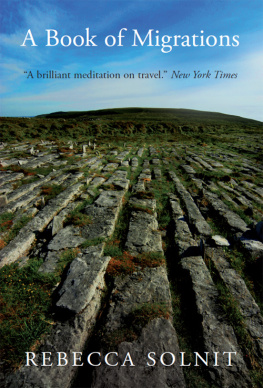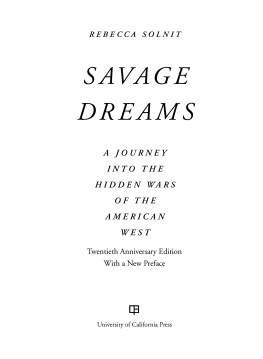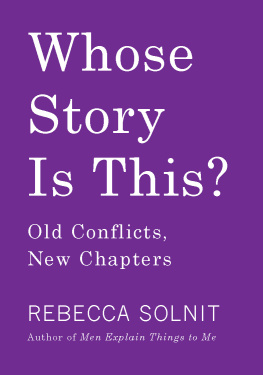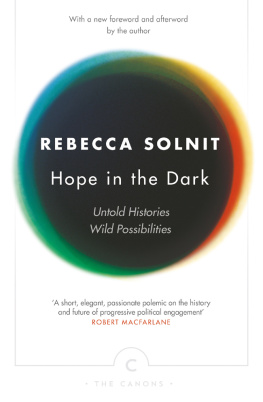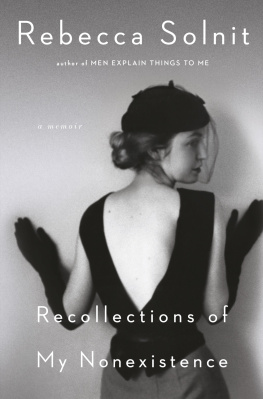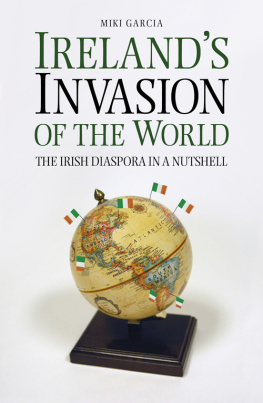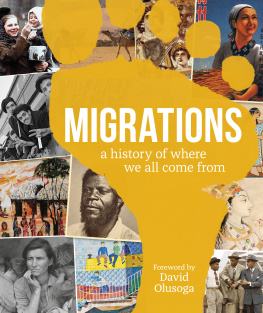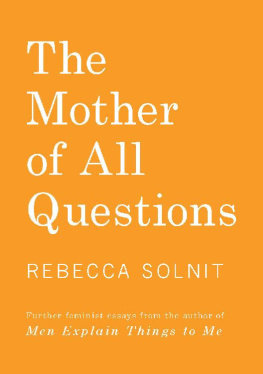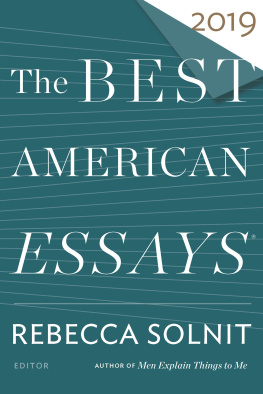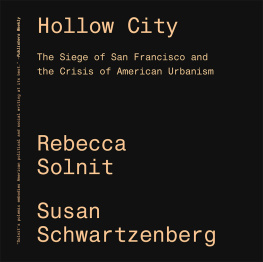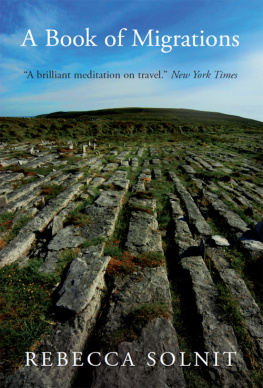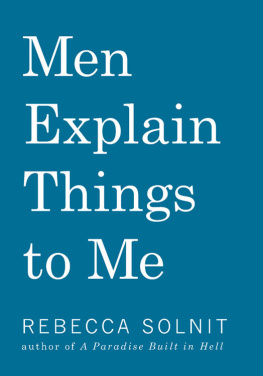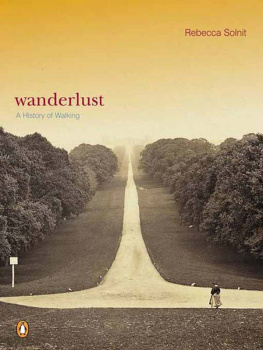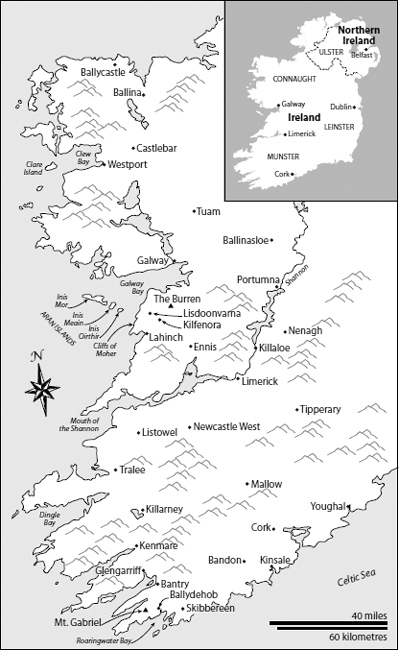REBECCA SOLNIT is author of, among other books, Wanderlust, A Field Guide to Getting Lost, the NBCC Awardwinning River of Shadows and Infinite City. A contributing editor to Harpers, she writes regularly for, among others, the London Review of Books and the Los Angeles Times. She lives in San Francisco.
A Book of Migrations
Some Passages in Ireland
REBECCA SOLNIT
First published by Verso 1997
Paperback edition first published by Verso 1998
This revised paperback published by Verso 2011
Rebecca Solnit 2011
All rights reserved
The moral rights of the author have been asserted
1 3 5 7 9 10 8 6 4 2
Verso
UK: 6 Meard Street, London W1F 0EG
US: 20 Jay Street, Suite 1010, Brooklyn, NY 11201
www.versobooks.com
Verso is the imprint of New Left Books
e-Book ISBN-13: 978-1-84467-814-3
British Library Cataloguing in Publication Data
A catalogue record for this book is available from the British Library
Library of Congress Cataloging-in-Publication Data
A catalog record for this book is available from the Library of Congress
Typeset in Minion by Hewer Text UK Ltd, Edinburgh
Printed in the US by Maple Vail
Contents
Acknowledgments
This book goes out with thanks to the people who laid its foundationsmy uncle, Thomas Davis Allen, whose identification with Ireland and genealogical research there provided me with the cypher of Irish citizenship; my mother, Theresa Allen, who was, during my childhood, working for civil rights and urging me to draw oak trees; and Lee Snodgrass and Paddy OLeary, whose friendship and storytelling verve on my first visit to Ireland were among the strongest inducements to returnas well as to Versos American editors, Mike Davis, who was encouraging about this book when it was nothing more than ideas and notes, and Michael Sprinker who was there throughout the writing. I also thank Sister Kathleen and the Portumna Sisters of Mercy and Cathleen MacDonagh and her family for their hospitality on my journey; Ray Ryan of Cambridge University Press who read the manuscript and made valuable suggestions; Bonnie Nadell and Irene Moore of Frederick Hill Associates Literary Agency; Alice OMalley; Lucy Lippard, for whom I housesat while writing the first chapters in late 1994 and some others in the summer of 95; Bill Studebaker and Brenda Larsen; Pame Kingfisher and Kiya Heartwood who, in an early version of my travel plans, were to accompany me and who had much to say about ethnicity, music, and memory; and various others whose conversation and friendship have been important: Lewis deSoto, Tim and John OToole, Sono Osato, Sarah Wright, Dana Schuerholz, Dianne Driscoll Nepali, Valerie Soe, my brothers Stephen and David who were, respectively, organizing for immigrants rights and the rights of the homeless as I wrote, and, last but most, the lovely Pat, snake charmer and hillwalker, formerly of Joshua Tree. Finally, I have been meaning since my first book to credit the city of San Franciscos rent control policy, which has helped secure for me the increasingly rare circumstances in which independent research and writing can be done.
the past is a country from which we have all emigrated
Salman Rushdie
Every day is a journey, and the journey itself is home.
Basho
Preface
On the last day of 1986, I became an Irish citizen. My newfound status as a European has not yet ceased to bemuse memy purple passport with its golden harp seems less like a birthright than a slim book on the mythologies of blood, heritage, and emigration. And so a few summers ago I went to this foreign country that claims me to think about these things. This is not a book about Ireland so much as it is a book about a journey through Ireland. I hasten to disclaim any great authority on the subjects of Irish history and culture, though my literal, geographical journey was overtaken by two longer journeys: though readings in Irish history and literature and through the writing itself (to say nothing of a follow-up trip to round out my researches). This is likewise no core sample of contemporary Ireland; in the same spirit Irish tourists may head straight for Graceland, I took off for the places that appealed to me and let attraction and invitations stitch together the rest of my route.
Ireland delighted me by offering so many stories and circumstances in which individuals and populations were fluid rather than ossified, undermining the usual travelers dichotomy of a mobile figure in an immobile landscape. It was this play between memory, identity, movement, and landscape that I wanted to explore, and the ebb and flow of populations that constitutes invasion, exile, colonization, emigration, tourism, and nomadism. In other terms, this excursion offered me a whole set of linked possibilities: to muse about the identity politics raised by my American activism and my Irish passport; to rethink my education in English literatureto separate the status of great literary works from that of great landmarks of civilization, for which Ireland as a kind of backstage to the drama of imperial Britain is ideal; to look at a place where the tidy phrases of contemporary conversationterms like native and white and Europe and first worldbegin to fray and come apart.
Travel is also a psychic experiment. In different places, different thoughts emerge, and this too I wanted to trace. I tried to use the subjective and personal not to glorify my mundane autobiography but as a case study in how one can explore the remoter reaches of the psyche by wandering across literal terrain. This book is itself not a travel book in the usual sense, but a book of essays sequenced and shaped by my journey. That journey is the continuous thread running through the chapters, which can be regarded as variously faceted beads, each one made differently from the raw materials of landscape and identity, remembering and forgetting, the fixed and the fluctuant, and out of travel itselfout of my own modest passage and all the great tides any such journey echoes.
Preface to the New Edition
The stream of consciousness most famously caught in Joyces Molly Bloom soliloquy at the end of Ulysses is a coming home to the internal self, and in throwing myself into the unknown of another country, I wanted to also explore that territory of associations.
You walk through almost any but the most urgent and overwhelming landscape immersed in your own thoughts, a little atmosphere of home and self that surrounds you like mosquitoes, armor, perfume, or blinders, a second layer of self. When I wrote A Book of Migrations I wanted to include this inner layer of experience and to dismantle the conventions of travel writing, as in my previous book, Savage Dreams, I had tried to undo the limited and depoliticized scope of nature writing. I was prompted to go to Ireland for pleasure, and I hope that some of that pleasure comes through, but also for an inquiry on foot into a question that had arisen for me in the American West. There, a lot of Native Americans liked to assert that just as they were pure North American, not hybridized, so were people like me pure European. I doubted it, but I thought I should take my European passport and go fish. Or my sort of European passport, because Ireland is now a European Union member but was long where the idea of Europe got frayed and tattered around the edges, along with the ideas of white and of First World. I went not to confirm but to complicate and dissolve the definitions Id been handed, about Europeanness, whiteness, Irishness, about travel, place, and time. Which sounds serious, but it was a great excuse to wander around and pay attention to interior and exterior geographies, to the ways people read me, and to the way my readings inflected my adventure.
Next page
